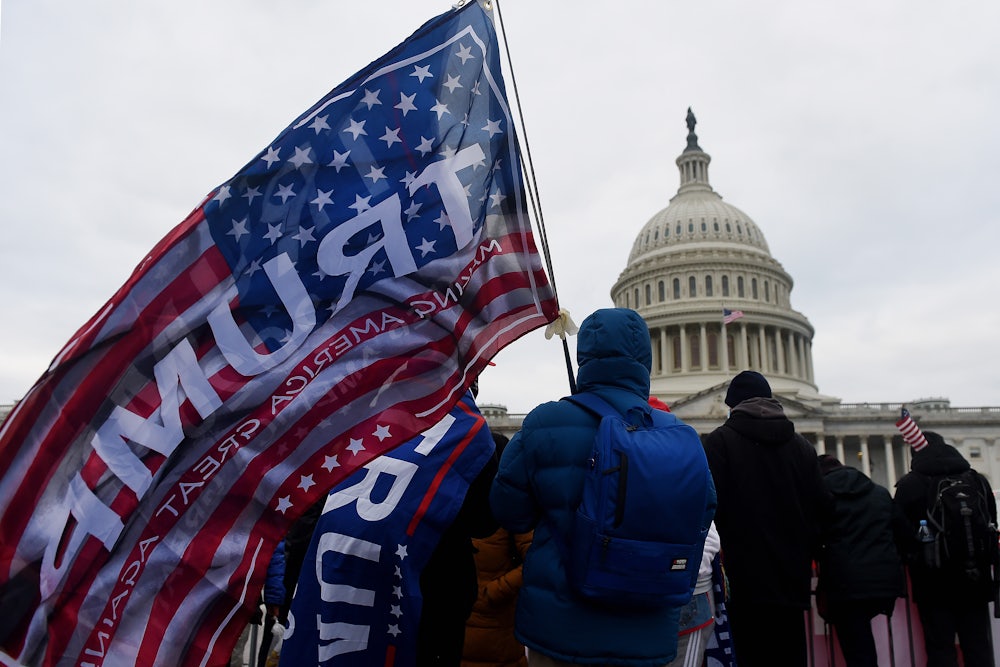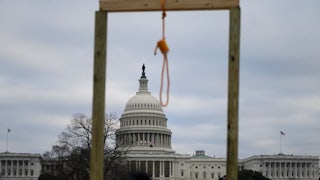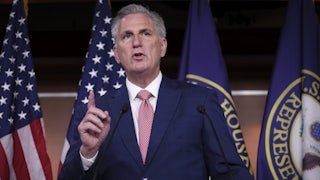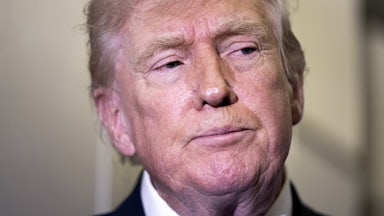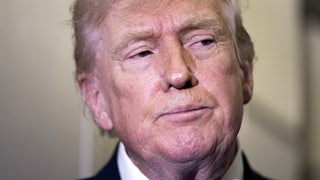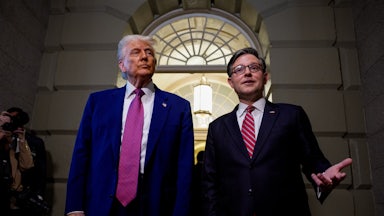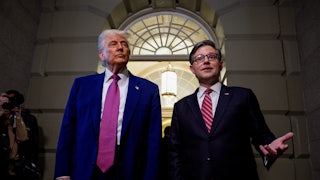On January 6, 2021, I slept in and planned to go into the Capitol late in the day because the certification of 2020’s electoral votes was expected to last through the night. But when it became clear that the peaceful transition of power was to be superseded by an insurrection, I hurried down, arriving just as the red-hatted crowd was smashing the windows.
I didn’t go into the building that day; instead I walked between the east and west steps, watching the people come and go through the surrendered Capitol. The crowd was so large that the cell towers were overloaded. You had to move to the back of the insurrection to reliably get a text message out. But I saw it. I was there, and I watched it happen. I saw cops bent over, pouring water into their eyes. And when the rioters outside heard that somebody had been killed inside the Capitol, I remember a man walking across the House triangle and hollering at the cops, something to the effect of Y’all better start covering that up.
It was at that moment that I understood that historical reality—what I was then witnessing—was bound to fracture. Narratives, some true and some false, would begin to split from the root. This effort, to mislead the public about what had happened on that day, began right away. And it continues to this day: In recent months, figures like Congresswoman Marjorie Taylor Greene and Fox News’s Tucker Carlson have made it their mission to whitewash the events of January 6.
Newly minted House Speaker Kevin McCarthy, apparently without telling the Capitol Police, lent Carlson tens of thousands of hours of security footage from January 6, to do with what he pleased. The riot may have passed, the broken windows may have been replaced, and the electoral votes may have been properly counted, but the information war that began on that day isn’t nearly over, nor is its deleterious effect on our civic fabric.
In the immediate aftermath of the Capitol attack, the fruits of discord were swiftly sown, even if the seeds that were planted were comparatively mealy. The pro-Trump Washington Times reported that “[a] facial recognition firm claims Antifa infiltrated Trump protesters who stormed Capitol.” The report was printed only hours after the insurrection and retracted only hours after it appeared online. But it existed long enough for the antifa-infiltration narrative was pushed on the House floor by Representative Matt Gaetz and on Fox News by Laura Ingraham and Sarah Palin, who said, “I think a lot of it is the antifa folks.”
The “antifa folks” narrative was abandoned within weeks—probably in part because its adherents so obviously knew it was false. Multiple Trump White House officials have said that Gaetz sought a broad pardon following the unsuccessful attempt to overturn the election. The Fox News texts showed that Ingraham understood precisely what was unfolding on January 6. Only hours before she knowingly lied to her audience, she was sending pleading texts to White House chief of staff Mark Meadows, at one point saying that the insurrection is “hurting all of us.”
This hasn’t stopped similar false narratives—that the insurrectionists who stormed the Capitol were “actors”; that the riot was sparked by agents of the FBI, CIA, or some other government agency; that the Capitol Hill police welcomed the rioters into the Capitol—from gaining purchase. Over time, the specifics of these false narratives blurred into the broader notion that January 6 wasn’t the grave endangerment of democracy that we saw on that day. That it wasn’t the unambiguous attack that we all witnessed, which began with an authoritarian leader inciting his supporters to violence in an attempt to remain in power and overthrow the current system of government.
A Pew Research study conducted in the days following the insurrection showed that a majority of Americans “expressed strong negative emotions” over the riot, but these reactions were already skewed along party lines. The study found that 17 percent of Republicans believed the false narrative pushed by The Washington Times, Gaetz, and Ingraham: The destruction of the Capitol was not due to Trump supporters but was instead the clandestine work of groups like antifa or Black Lives Matter.
But even with the right-wing propensity to leap into obvious falsehoods, the Pew study found that over half of Republicans believed that Trump deserved at least some blame for the insurrection. One week after the Capitol insurrection, then–Minority Leader Kevin McCarthy said on the House floor that “the president bears responsibility for [the] attack on Congress by mob rioters.” On January 6, Tucker Carlson’s producer texted him that Trump “is to blame for everything that happened today.”
But Republican powerbrokers proved to not have the stomach to concede the truth of what happened, swiftly climbing down from the position that Trump was uniquely responsible for the day’s events over the brief second impeachment of the president. Whatever truths may have sparked a hundred text messages between Fox News personalities stayed buried as well, out of either fear of lower ratings or helpless fealty to Trump. Gradually, the GOP’s base followed the tune: By September 2021, Pew found that only a quarter of Republicans felt it was important to prosecute the rioters at the Capitol—something half of them said was important in March 2021.
When the House passed into the hands of Republicans in January, Carlson and McCarthy quickly jumped back into Trump’s bunker together, in a joint attempt to remix extant footage from that day in order to cast the insurrectionists in a more favorable light. Carlson, armed with McCarthy’s ill-gotten video bounty, broadcast seconds-long clips of wandering (but also trespassing) insurrectionists and claimed that “they are not destroying the capitol—they obviously revered the capitol.” An Economist/YouGov study conducted in the days after Carlson’s prime-time disinformation parade found that over half of Republicans now consider January 6 legitimate political discourse.
“Legitimate political discourse” is, of course, the official label that the Republican Party gave to the insurrection when it censured Representatives Adam Kinzinger and Liz Cheney for participating in the House Select Committee on January 6. That committee was the vehicle with which Democrats—and those two Republicans—laid out the official narrative of January 6. If the committee was a partisan exercise, that criticism is not the fault of Democrats. Senate Republicans blocked the effort to form a bipartisan commission to investigate the insurrection. At the time, Senate Minority Leader Mitch McConnell said he did not think the commission would “uncover crucial new facts or promote healing.”
McConnell’s decision to vacate the Republican effort to guide the narrative toward something closer to the historical truth is arguably the catalyst that opened the door for Tucker Carlson’s whitewashing campaign. When asked about Carlson’s January 6 special, McConnell demurred, saying, “It was a mistake, in my view, for Fox News to depict this in a way that’s completely at variance with what our chief law enforcement official here at the Capitol thinks.” But 3.9 million people watched Carlson’s portrayal of the Capitol riots as “legitimate political discourse.”
By comparison, at least 20 million people watched the first January 6 hearing. The committee heard damning and dramatic testimony from Trump White House aides and as a body, the committee behaved with both the American public and the Washington press corps in mind. It will be remembered for Cassidy Hutchinson’s hours-long testimony but also for the two-second-long clip of Senator Josh Hawley sprinting away from the mob that he had cheered on only hours earlier.
And yet numerous polls found that the January 6 committee hearings had no effect on public opinion. One USA Today poll found that, after the hearings, 7 percent of Republicans “view the attack as more serious than they had [previously] thought.” A Monmouth poll showed that only 8 percent of respondents “changed their minds” following the hearings. And while there is some evidence that January 6 remains a ballot issue, it remains mostly a ballot issue for Democratic voters.
Democrats’ rosy results in the 2022 midterms may be partially attributed to lingering memories of January 6, but mostly the insurrection blended into a larger narrative pushed by Democrats about the extremism of “MAGA Republicans” and the threat they pose to our democracy. A study commissioned by Politico found that only 2 percent of broadcast ads in House races were focused on January 6.
Today, Republicans are somewhat divided in their approach to the aftermath of January 6. There is a pro-insurrection faction, which counts figures like Marjorie Taylor Greene and Tucker Carlson in its coterie, who are actively trying to rewrite history. In their version of the Capitol attack, the rioters were only tourists who smashed windows and assaulted the police not out of malice but with feelings of reverence. They claim the rioters are “political prisoners” or even “prisoners of war.” Greene has said that if she had organized the Capitol attack, “we would have won.” She believes it was an honorably fought battle within a larger, ongoing war.
And then there are the silent Republicans, figures like Governors Ron DeSantis and Glenn Youngkin—those who have been deafeningly mum on January 6. When asked about the insurrection, they dodge with bland nonresponses such as, “Let’s focus on things that are concerning American people today and helping us get through this period today.” The silent Republicans’ decision to vacate the narrative has left a vacuum for the pro-insurrectionist Republicans to fill. And so like it or not, the more circumspect faction have locked themselves into a trap of their own making, knowing that they cannot acknowledge the seriousness of January 6, lest it alienate a sizable part of their voter base, who, thanks to the fusillade of misinformation pumped into the discourse by their louder, frothing cousins, is growing more and more firmly pro-insurrection.
When Greene recently led a group of those pro-insurrection Republicans on a tour of a Washington, D.C., prison where the rioters are being held, she was joined by Democratic Representative Jasmine Crockett. The freshman congresswoman (and former public defender) served as a sort of observer to the tour. Afterward, Crockett said the conditions were better than she’s seen at prisons throughout the country, that the January 6 prisoners have access to tablets and laptops. When asked why she joined Greene’s pro-insurrection field trip, Crockett said, “Somebody’s got to be here to tell the truth.” But that truth is struggling to gain a purchase alongside the Republicans’ twin campaigns of forgetting and forgiving.
